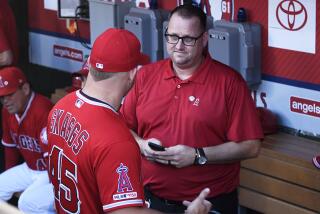Appeals court looks at evidence in Bonds perjury case
- Share via
SAN FRANCISCO — A federal appeals court appeared divided Thursday about whether key evidence in the Barry Bonds perjury prosecution should be kept from a jury.
During a 30-minute hearing, a three-judge panel of the U.S. 9th Circuit Court of Appeals considered a government appeal of a pretrial ruling excluding evidence prosecutors said would show that the former San Francisco Giants slugger lied under oath when he said he never knowingly used banned substances.
Two of the court’s more liberal judges, Stephen Reinhardt and Mary M. Schroeder, asked questions skeptical of the prosecution, while Judge Carlos T. Bea, a conservative, challenged a lawyer for Bonds.
At issue is whether the prosecution can introduce laboratory logs and test results that were positive for steroids without the testimony of Greg Anderson, Bonds’ former trainer, to tie the tests to Bonds. Anderson has refused to testify.
The prosecution maintains the evidence can be authenticated by a laboratory executive who said that Anderson had told him the samples came from Bonds.
Bonds has said while under oath that he gave Anderson samples, adding that the tests were to determine if he had any nutritional deficiencies.
U.S. District Judge Susan Illston, who made the pretrial ruling, said the evidence is hearsay without Anderson’s testimony.
The hearsay rule generally says that testimony or documents that quote another person are inadmissible when the person is not in court to verify his words and to be examined by the jury for credibility and demeanor.
Federal prosecutors said the evidence should be allowed as exceptions to the rule. They said Anderson acted as Bonds’ agent and therefore the laboratory executive should be allowed to testify as if Bonds himself had relayed the information about the samples.
Assistant U.S. Atty. Barbara Valliere said the evidence was admissible because Bonds gave Anderson “broad authority” to test and identify the samples.
But Dennis P. Riordan, an attorney for Bonds, told the court there was “no area in which lies and forgeries and mistakes occur more commonly than the area of drug testing.”
--
More to Read
Get the L.A. Times Politics newsletter
Deeply reported insights into legislation, politics and policy from Sacramento, Washington and beyond. In your inbox twice per week.
You may occasionally receive promotional content from the Los Angeles Times.






